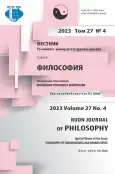Квантовая концепция сознания: за или против?
- Авторы: Князев В.Н.1,2, Паршикова Г.В.3
-
Учреждения:
- Московский педагогический государственный университет
- Национальный исследовательский университет «МЭИ»
- Брянский государственный технический университет
- Выпуск: Том 27, № 4 (2023): ФИЛОСОФИЯ СОЗНАНИЯ И НЕЙРОНАУКИ
- Страницы: 901-914
- Раздел: ФИЛОСОФИЯ СОЗНАНИЯ И НЕЙРОНАУКИ
- URL: https://journal-vniispk.ru/2313-2302/article/view/325220
- DOI: https://doi.org/10.22363/2313-2302-2023-27-4-901-914
- EDN: https://elibrary.ru/SOKBBK
- ID: 325220
Цитировать
Полный текст
Аннотация
Рассматривается проблемная гипотеза возможных подходов к выявлению квантово-физических оснований функционирования сознания. Авторы исходят из того, что в современных условиях ни одна наука, ни все науки вместе взятые не дают окончательного ответа на вопрос о «механизме» происхождения мысли. Однако это совершенно не означает того, что исследования в этом направлении необходимо остановить. Авторы выражают уверенность в том, что современные и последующие исследования «квантовой концепции сознания» приведут к выявлению ранее неизвестных закономерностей, открывающих путь к формированию новых принципов и подходов. В качестве примера рассматривается соответствующая концепция Пенроуза - Хамероффа. Квантовая механика дополняет инструментарий нейробиологии и других отраслей нейронауки, которые в совокупности формируют междисциплинарную область знаний, динамически растущую и развивающуюся. Авторы не являются апологетами всесилия квантовой физики. Квантовые корреляты сознания фактически означают, что не сама по себе сегодняшняя квантовая механика объясняет возникновение ментальных состояний, а то, что в рождении этих состояний существенно то, что в самом процессе становления нейродинамических импульсов в нейронах коры головного мозга, порождающих ментальные состояния, лежат процессы квантовой природы. Следует также признать, что квантово-молекулярный уровень (наноуровень) процессов в нейронах головного мозга реально существует, и именно он является истоком протосознания. Наука стремится идти вперед, появляются новые исследовательские программы в рамках квантовой биологии, квантовой психологии, квантовой информатики, которые в свою очередь могут проливать свет на гипотезу «квантовой концепции сознания».
Об авторах
Виктор Николаевич Князев
Московский педагогический государственный университет; Национальный исследовательский университет «МЭИ»
Автор, ответственный за переписку.
Email: kvn951@inbox.ru
ORCID iD: 0000-0003-1956-7229
доктор философских наук, профессор, профессор кафедры философии
Российская Федерация, 111250, Москва, ул. Красноказарменная, д. 14Галина Васильевна Паршикова
Брянский государственный технический университет
Email: parshikovagalina@yandex.ru
ORCID iD: 0009-0003-9700-2853
кандидат философских наук, доцент, кафедра гуманитарных и социальных дисциплин
Российская Федерация, 241035, Брянск, б-р 50 лет Октября, д. 7Список литературы
- Axel R. Q&A. Neuron. 2018;99:1110.
- Hameroff S, Penrose R. Consciousness in the Universe: A Review of the «Orch OR» Theory. In: Biophysics of Consciousness: A Foundational Approach. Singapore: World Scientific; 2016. P. 517—630.
- Stapp HP. Mind, matter and quantum mechanics. 3rd Edition. Berlin: Springer; 2009.
- Penrouz R, Shimoni A, Kartrayt N, Khoking S. The big, the small and the human mind. Saint Petersbirg: Amfora publ.; 2008. (In Russian).
- Kurtsveyl R. How to create a mind: the secret of human thinking revealed. Moscow: Eksmo publ.; 2015. (In Russian).
- Chalmers D. The conscious mind. In search of a fundamental theory. Moscow: URSS, Librokom publ.; 2013. (In Russian).
- Menskiy MB. Man and the quantum world. Fryazino: Vek2 publ.; 2007. (In Russian).
- Eccles J. How the self controls its brain. Berlin: Springer; 1994. P. 145—165.
- Wang H, Sun Y. On Quantum Models of the Human Mind. Topics in Cognitive Science. 2014;6(1);98—103. https://doi.org/10.1111/tops.12064
- Ball P. Physics of life: The dawn of quantum biology. Nature. 2011;(474):272—274. https://doi.org/10.1038/474272a
- Cherepanov IV. The role of quantum mechanics in understanding the phenomenon of consciousness. RUDN Journal of Philosophy. 2022;26(4):770—789. (In Russian). https://doi.org/10.22363/2313-2302-2022-26-4-770-789
- Smith Q. Why Cognitive Scientists Cannot Ignore Quantum Mechanics? In: Consciousness: New Philosophical Perspectives. Oxford: Oxford University Press; 2003. P. 409—447.
- Parshikova GV. Linguistic concept and qualitative content of mental states in objectification of the nature of consciousness. Pushkin Leningrad State University Journal. 2015;2(1):70—79. (In Russian).
- Vasilyev VV. The difficult problem of consciousness. Moscow: Progress-Traditsiya publ.; 2009. (In Russian).
- McCalloch WS, Pitts W. A logical calculus of the ideas immanent in nervous activity. Bull. Math. Biophys. 1943;5:115—133. https://doi.org/10.7551/mitpress/12274.003.0011
- Aksenov SV, Novoseltsev VB. Organization and use of neural networks: (methods and technologies). Novoseltseva VB, editor. Tomsk: Izd-vo nauch.-tekhnicheskoy lit. publ.; 2006. (In Russian).
- Guzik V, Gushanskiy S, Polenov M, Potapov V. Architecture and Software Implementation of a Quantum Computer Model. 5th Computer Science On-line Conference (CSOS). Czech Republic; 2016. P. 59—68.
- Penrouz R. Shadows of the Mind: in Search of the Science of Consciousness. Part I. Understanding the Mind and the new Physics. Moscow, Izhevsk: Institut kompyutornykh issledovaniy publ.; 2003. (In Russian).
- Jaeger L. The Second Quantum Revolution. From Entanglement to Quantum Computing and Other Super-Technologies. Copernicus; 2018.
- Aspelmeyer M, Zeilinger A. A quantum renaissance. Physics World. 2008;21(7):22—28. https://doi.org/10.1088/2058-7058/21/07/34
- Wichert А. Quantum Cognition and the Mind. Journal of Artificial Intelligence and Consciousness. 2021;8(1):161—170. https://doi.org/10.1142/s2705078521500016
- Fisher M. Quantum Cognition: The Possibility of Processing with Nuclear Spins in the Brain. Annals of Physics. 2015;(362):593—602. https://doi.org/10.1016/j.aop.2015.08.020
- Knyazev VN, Parshikova GV. Об особенностях функционирования сознания в контексте квантовой информатики. Metaphysics. 2022;4(46):130—143. (In Russian).
- Menskiy MB. Consciousness and Quantum Mechanics: Life in Parallel Worlds (Miracles of Consciousness — from Quantum Reality). Fryazino: Vek2 publ.; 2011. (In Russian).
- Kanke VA. Philosophy of mathematics, physics, chemistry, biology. Moscow: KNORUS publ.; 2011. (In Russian).
- Menskiy MB. Intuition and the quantum approach to the theory of consciousness. Voprosy filosofii. 2015;(4):48—57. (In Russian).
- Dubrovskiy DI. Critical analysis of the Penrose-Hameroff theory of Consciousness. Part 1. Filosofiya nauki i tekhniki. 2017;22(1):125—136. (In Russian).
- Dubrovskiy DI. Critical analysis of the Penrose-Hameroff theory of Consciousness. Part 2. Filosofiya nauki i tekhniki. 2017;22(2):89—102. (In Russian).
Дополнительные файлы









